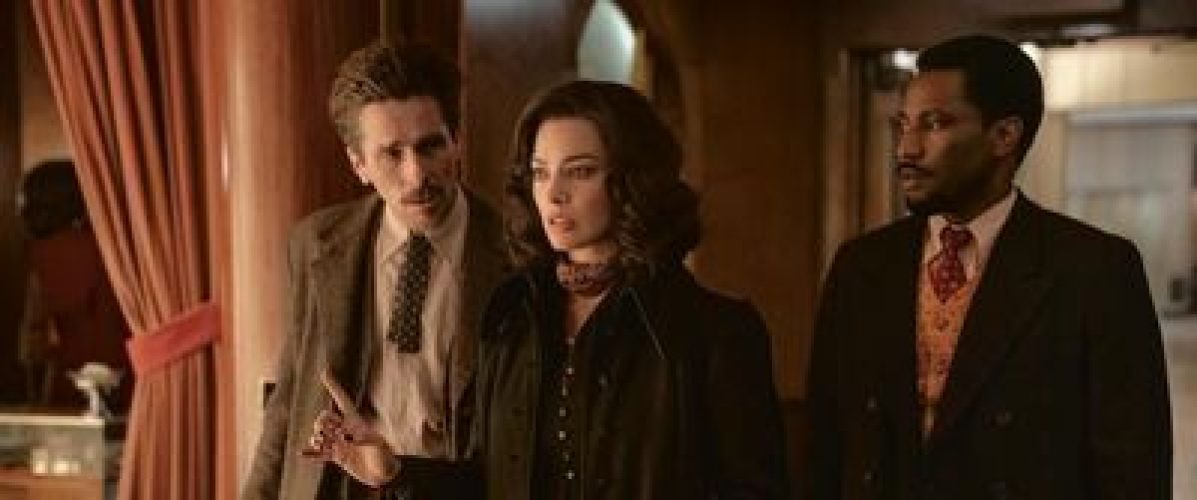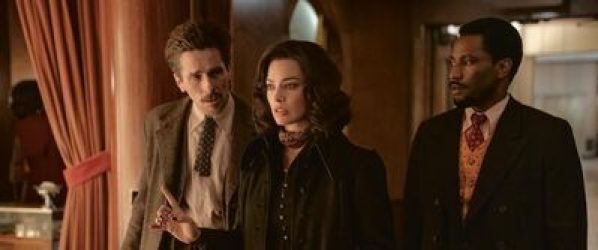Simultaneously overstuffed and undernourished, frantic and meandering, “Amsterdam” is one big, star-studded, hot mess of a movie.
Christian Bale, Margot Robbie, John David Washington, Robert De Niro, Anya Taylor-Joy, Rami Malek, Chris Rock, Michael Shannon, Zoe Saldana, Alessandro Nivola and many more major names: How can you amass this cast and go so wrong? Simply putting them in a room and watching them chit-chat for two-plus hours—or say nothing at all, for that matter—would have been infinitely more interesting. Alas, David O. Russell has concocted all manner of adventures and detours, wacky hijinks, and elaborate asides to occupy his actors, none of which is nearly as clever or charming as he seems to think.
Over and over again, I asked myself as I was watching “Amsterdam”: What is this movie about? Where are we going with this? I’d have to stop and find my bearings: What exactly is happening now? And not in a thrilling, stimulating way, as in “Memento,” for example, or “Cats.” It’s all a dizzying piffle—until it stops dead in its tracks and forces several of its stars to make lengthy speeches elucidating the points Russell himself did not make over the previous two rambling hours. Robbie in particular is saddled with some interminable, treacly narration, explaining the importance of love and kindness over images of bohemian rhapsody we’d just seen in the film not too long ago.
As is the case in so many of the writer/director’s other movies, we have the sensation as we’re watching that anything could happen at any moment. He typically employs such verve in his camerawork and takes such ambitious tonal swings that you wonder in amazement how he manages to keep it all cohesive and intact. This time, he doesn’t. Because “Amsterdam” lacks the compelling visual language of “Three Kings” or “American Hustle,” for instance, and it lacks characters with heart-on-their-sleeve humanity like he shows us in “The Fighter” or “Silver Linings Playbook.” Despite the prodigious talent on display here, not a single figure on screen feels like a real person. Each is a collection of idiosyncrasies, some more intriguing than others.
To put it in the simplest terms possible, Bale and Washington play longtime best friends suspected of a murder they didn’t commit. While trying to uncover the truth about what’s going on, they stumble upon an even larger and more sinister plot. Russell’s script jumps around in time from 1933 New York to 1918 Amsterdam and back again, but he’s using this time frame—and the fascist ideologies that rose to prominence then—to make a statement about what’s been going on the past several years in right-wing American politics. Ultimately, he hammers us over the head with this point. But first, whimsy.
Bale’s Burt Berendsen is a folksy doctor with a glass eye that keeps falling out. He’s hooked on his own homemade pain meds, which cause him to collapse to the ground—which also causes his eye to fall out. Bale is doing intense shtick throughout; he is committed to the bit. Washington’s Harold Woodman served with him in the same racially mixed Army battalion in France during WWI; he’s now an attorney, and the more levelheaded of the two. When their beloved general dies suspiciously, his daughter (a distractingly stiff Taylor Swift) asks them to investigate.
But soon, they’re on the run, inspiring a flashback to how they met in the first place. This is actually the most entertaining part of the film. Russell luxuriates in the duo’s wistful memories of their post-war years in Amsterdam with Robbie’s Valerie Voze, the nurse who cared for them when they were injured and quickly became their co-conspirator in all kinds of boozy escapades. The celebrated cinematographer Emmanuel Lubezki, a multiple Oscar winner for his work with Alfonso Cuaron (“Gravity”) and Alejandro Gonzalez Inarritu (“Birdman,” “The Revenant”), eases up on the sepia tones that often feel so smothering in an effort to capture a feeling of nostalgia. There’s real life and joy to these sequences in Amsterdam that’s missing elsewhere. Robbie, a brunette for a change, looks impossibly luminous—but her character is also a Manic Pixie Dream Girl, a secretly wealthy heiress who turns bullet shrapnel into art. It’s a heavy-handed metaphor for the healing presence she provides in Burt and Harold’s lives.
That’s what’s so frustrating about “Amsterdam”: It’ll offer a scene or an interaction or a performance here or there that’s legitimately entertaining and maybe comes close to hitting the mark Russell is trying to hit. Several duos and subplots along the way might have made for a more interesting movie than the one we got: Malek and Taylor-Joy as Valerie’s snobby, striving brother and sister-in-law, for example, are a bizarre hoot. (And here’s a great place to stop and mention the spectacular costume design, the work of J.R. Hawbaker and the legendary Albert Wolsky. The period detail is varied and vivid, but the dresses Taylor-Joy wears, all in bold shades of red, are especially inspired.) Nivola and Matthias Schoenaerts as mismatched cops who can’t stand each other can be amusing, and it seems like they’re really trying to infuse their characters with traits and motivations beyond what’s on the page. Shannon and Mike Myers as a pair of spies are good for a goofy laugh or two, nothing more.
But despite these sporadic moments of enjoyment, “Amsterdam” is ultimately so convoluted and tedious that it obliterates such glimmers of goodwill. It’s so weighed down by its overlong running time and self-indulgent sense of importance that its core message about the simple need for human decency feels like a cynical afterthought. And whispering the word “Amsterdam” throughout, as several of the characters do, doesn’t even begin to cast the magic spell it seeks to conjure.
Now playing in theaters.
Simultaneously overstuffed and undernourished, frantic and meandering, “Amsterdam” is one big, star-studded, hot mess of a movie. Christian Bale, Margot Robbie, John David Washington, Robert De Niro, Anya Taylor-Joy, Rami Malek, Chris Rock, Michael Shannon, Zoe Saldana, Alessandro Nivola and many more major names: How can you amass this cast and go so wrong? Simply putting them in a room and watching them chit-chat for two-plus hours—or say nothing at all, for that matter—would have been infinitely more interesting. Alas, David O. Russell has concocted all manner of adventures and detours, wacky hijinks, and elaborate asides to occupy his actors, none of which is nearly as clever or charming as he seems to think. Over and over again, I asked myself as I was watching “Amsterdam”: What is this movie about? Where are we going with this? I’d have to stop and find my bearings: What exactly is happening now? And not in a thrilling, stimulating way, as in “Memento,” for example, or “Cats.” It’s all a dizzying piffle—until it stops dead in its tracks and forces several of its stars to make lengthy speeches elucidating the points Russell himself did not make over the previous two rambling hours. Robbie in particular is saddled with some interminable, treacly narration, explaining the importance of love and kindness over images of bohemian rhapsody we’d just seen in the film not too long ago. As is the case in so many of the writer/director’s other movies, we have the sensation as we’re watching that anything could happen at any moment. He typically employs such verve in his camerawork and takes such ambitious tonal swings that you wonder in amazement how he manages to keep it all cohesive and intact. This time, he doesn’t. Because “Amsterdam” lacks the compelling visual language of “Three Kings” or “American Hustle,” for instance, and it lacks characters with heart-on-their-sleeve humanity like he shows us in “The Fighter” or “Silver Linings Playbook.” Despite the prodigious talent on display here, not a single figure on screen feels like a real person. Each is a collection of idiosyncrasies, some more intriguing than others. To put it in the simplest terms possible, Bale and Washington play longtime best friends suspected of a murder they didn’t commit. While trying to uncover the truth about what’s going on, they stumble upon an even larger and more sinister plot. Russell’s script jumps around in time from 1933 New York to 1918 Amsterdam and back again, but he’s using this time frame—and the fascist ideologies that rose to prominence then—to make a statement about what’s been going on the past several years in right-wing American politics. Ultimately, he hammers us over the head with this point. But first, whimsy. Bale’s Burt Berendsen is a folksy doctor with a glass eye that keeps falling out. He’s hooked on his own homemade pain meds, which cause him to collapse to the ground—which also causes his eye to fall out. Bale is doing intense shtick throughout; he is committed to the bit. Washington’s Harold Woodman served with him in the same racially mixed Army battalion in France during WWI; he’s now an attorney, and the more levelheaded of the two. When their beloved general dies suspiciously, his daughter (a distractingly stiff Taylor Swift) asks them to investigate. But soon, they’re on the run, inspiring a flashback to how they met in the first place. This is actually the most entertaining part of the film. Russell luxuriates in the duo’s wistful memories of their post-war years in Amsterdam with Robbie’s Valerie Voze, the nurse who cared for them when they were injured and quickly became their co-conspirator in all kinds of boozy escapades. The celebrated cinematographer Emmanuel Lubezki, a multiple Oscar winner for his work with Alfonso Cuaron (“Gravity”) and Alejandro Gonzalez Inarritu (“Birdman,” “The Revenant”), eases up on the sepia tones that often feel so smothering in an effort to capture a feeling of nostalgia. There’s real life and joy to these sequences in Amsterdam that’s missing elsewhere. Robbie, a brunette for a change, looks impossibly luminous—but her character is also a Manic Pixie Dream Girl, a secretly wealthy heiress who turns bullet shrapnel into art. It’s a heavy-handed metaphor for the healing presence she provides in Burt and Harold’s lives. That’s what’s so frustrating about “Amsterdam”: It’ll offer a scene or an interaction or a performance here or there that’s legitimately entertaining and maybe comes close to hitting the mark Russell is trying to hit. Several duos and subplots along the way might have made for a more interesting movie than the one we got: Malek and Taylor-Joy as Valerie’s snobby, striving brother and sister-in-law, for example, are a bizarre hoot. (And here’s a great place to stop and mention the spectacular costume design, the work of J.R. Hawbaker and the legendary Albert Wolsky. The period detail is varied and vivid, but the dresses Taylor-Joy wears, all in bold shades of red, are especially inspired.) Nivola and Matthias Schoenaerts as mismatched cops who can’t stand each other can be amusing, and it seems like they’re really trying to infuse their characters with traits and motivations beyond what’s on the page. Shannon and Mike Myers as a pair of spies are good for a goofy laugh or two, nothing more. But despite these sporadic moments of enjoyment, “Amsterdam” is ultimately so convoluted and tedious that it obliterates such glimmers of goodwill. It’s so weighed down by its overlong running time and self-indulgent sense of importance that its core message about the simple need for human decency feels like a cynical afterthought. And whispering the word “Amsterdam” throughout, as several of the characters do, doesn’t even begin to cast the magic spell it seeks to conjure. Now playing in theaters. Read More


